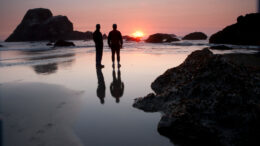It’s been quite a year so far — and we expect the last four months of the year to be even more tumultuous.
In light of the battles ahead, we’re about to take a short recharge break. We hope you have a chance to do the same. As I like to say, “recreation = re-creation.”
We’ll be back with new articles and commentaries on Sept. 6, but we won’t exactly be resting on our laurels during our two-week break. We have stories to research and write, pieces to edit, messages to share and inspiration to draw in close.
And meanwhile, we have an assignment (or 15) for you — things you can do over the next couple of weeks to help set the path for an eventful and powerful rest of the year:
-
- Thank someone for helping the planet. It could be a politician, scientist, activist, journalist, or even a neighbor. Too many good deeds go unrecognized, and even the briefest appreciation can do wonders to help someone keep moving forward.
- Write to someone in power and ask them to do more (or better). Never underestimate the power of a well-argued personal note.
- Plan your autumn activism or set your environmental goals for the rest of the year. There’s so much happening: Protests, petitions, cleanups, tree planting, op-ed writing — the sky’s the limit.
- Tell us what to cover next. Story tips always welcome.
- Write something for us! We’re always looking for op-eds, submissions to our Species Spotlight and Protect This Place features, or freelance pitches. Full details here.
- Take a walk, open a window — enjoy the sounds of nature however you’re able. Listen to the wind, birdcalls, bees buzzing…and let them help you remember what’s worth fighting to save.
- Read an environmental book. We have plenty of recommendations to choose from.
- Walk a mile in a climate-disaster survivor’s shoes (or an endangered species’ paws/flippers/hooves). The more we think about what others go through as their homes, communities and ecosystems are destroyed, the better we’re able to advocate for them before the next disaster.
- Donate to an environmental group or disaster-recovery organization. Time, money and expertise are all needed and valued.
- Share your favorite Revelator article with a friend or on social media. We have more than 1,000 to choose from.
- Send us your favorite recent nature photo. We like mail.
- Submit a public comment on pending environmental legislation or regulations. If you don’t speak up, who will?
- Participate in democracy. Make your plan to vote in the upcoming midterms. If you already know where and how to cast your ballot, consider signing up to be a poll worker or watcher. We expect some tomfoolery in upcoming election cycles.
- Think about history. Looking back helps us to look forward, and there are several ways to do this. Consider how the environmental qualities where you live have changed over the past few years or decades. If you’re not Indigenous, find out on whose land you reside, how it was stolen and what recognition local Tribes still need. Reflect on recent environmental wins and losses. Think about species you haven’t seen or heard about lately that may have experienced invisible declines. Or maybe ask yourself: How can I make history in the months ahead?
- Subscribe to our newsletter. Be prepared for the latest headlines as we return from our publishing break.
That’s it for now. We’ll see you on Sept. 6. Until then, stay safe and stay connected.
![]()


